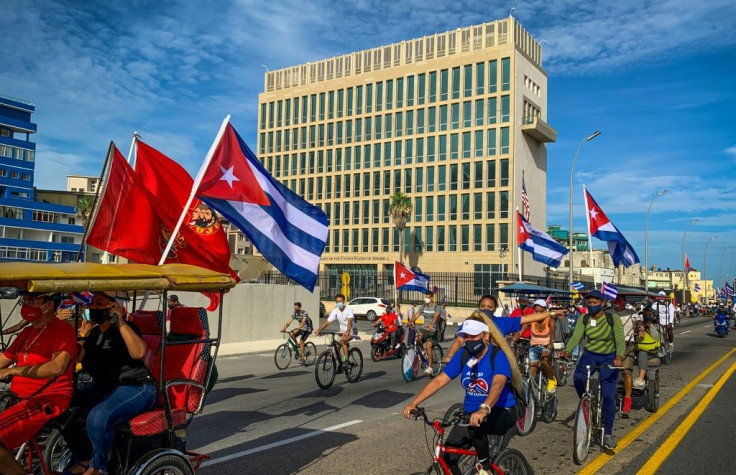State Department Official Loses Job As Diplomats Seethe Over Havana Syndrome Response
KEY POINTS
- Diplomats, who faced health issues, had called for Pamela Spratlen's resignation
- They said Spratlen had lost the confidence of affected employees
- Spratlen did not rule out "mass hysteria" as a reason for the Havana Syndrome
A top official roped in by the State Department to directly oversee its response to the mysterious 'Havana Syndrome' has lost her position just six months into the job amid anger and dissatisfaction among diplomats at the what they see as the agency's failure to take care of its officers, reports said.
Ambassador Pamela Spratlen's departure comes as the State Department faces questions about its response to the syndrome, first reported four years ago, reported NBC News. U.S. diplomats, who faced health issues following the incidents, had called for her resignation, saying Spratlen had "lost the confidence of affected employees."
The Havana Syndrome was first reported in late 2016 when diplomats posted in Cuba began experiencing dizziness and pounding headaches, sometimes accompanied by an unidentified "piercing directional noise." More 'attacks' were reported by personnel in Russia and China. And a member of the team of Central Intelligence Agency Director William Burns reportedly suffered symptoms consistent with the syndrome during a secret trip to India.
A CNN report, quoting a newly declassified but heavily redacted 2018 State Department Accountability Review Board report, said 24 affected diplomats were diagnosed with brain damage. The cause was then determined as microwave radiation, with effects ranging from vertigo to insomnia to brain trauma.
Following this, the CIA formed a Health Incident Response Task Force last December to address the attacks to support individuals who may have been affected or face a similar attack in the future.
In March, Spratlen was brought back from retirement by the Biden administration as a senior adviser to the task force. While roping her in, Secretary of State Antony Blinken had said she would "help us make strides to address this issue wherever it affects Department personnel and their families."
However, in a recent meeting with Blinken, the affected diplomats had voiced their anger at the "continuing stigma and disbelief within the U.S. government about their injuries."
Though Blinken reassured that the administration is doing all to provide care, the diplomats said they are still facing issues getting proper medical care, evaluation, and benefits. The skepticism about the injuries is pervasive even among some high-level government officials, they complained.
Days after the meeting, the plans for Spratlen’s departure were finalized, said the NBC report. The State Department said Wednesday that Spratlen was leaving now because she had “reached the threshold of hours of labor” allowed under her status as a retiree. Her replacement will be named soon.
Recently, an FBI study had found no evidence of an attack and determined that the staffers were most likely to be suffering from mass psychogenic illness, or mass hysteria. To this, Spratlen said she had read the study but did not indicate that she agreed or disagreed with its findings. Diplomats described that as "invalidating."
Marc Polymeropoulos, a former senior CIA officer who says he was hit by Havana Syndrome in Russia in 2017, took to Twitter to make his feelings known about "the utter failure of the State Dept to take seriously care for their officers."
She was a total disappointment, and frankly a reflection of the utter failure of the State Dept to take seriously care for their officers..a terrible stain that has led to incredible suffering for the victims...Blinken needs to look across the river to Bill Burns leadership. https://t.co/PtmBr0yNiF
— Marc Polymeropoulos (@Mpolymer) September 23, 2021
He had earlier tweeted that declining to rule out the “mass hysteria” theory was “insulting to victims and automatically disqualifying” from leading the task force. "State is not serious until Ambassador Spratlen is replaced," Polymeropoulos had said.

© Copyright IBTimes 2025. All rights reserved.





















